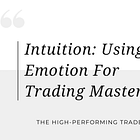The Thin Line Between Confidence and Ego
How to tell if your conviction is grounded in confidence or ego.
You’re reading the Thursday Trader’s Tip — the free edition of this newsletter with trading psychology wisdom in under 5 min.
Want deep dives on trading performance topics, tools & templates to enhance your trading psychology, and access to live webinars? Try the paid plan.
There’s a thin line between confidence and ego in trading.
Confidence is knowing your plan will work in the long run.
Ego is thinking you’re smarter than the market.
One helps you build consistency. The other makes sure you eventually give it all back.
But in practice, it’s not so easy to tell them apart. I’ve coached traders who were afraid to trust their conviction because they thought it might actually be ego. They second-guessed good trades simply because they didn’t want to cross that invisible line.
So how do you know the difference?
The keyword is acceptance.
If you’re convicted in a trade but fully aware of the worst-case scenario and accept the risk, that’s confidence. If you’re only seeing the reward and dismissing the possibility of loss, that’s ego.
Ego is blind to risk—it refuses to accept it. Confidence accepts risk and acts anyway.
Why the line feels so blurry?
Part of the reason confidence and ego are so hard to separate is that they look and feel the same way physiologically and even emotionally. Both bring energy, conviction, and decisiveness. The difference lies in what the inner voice is grounded on.
Confidence is rooted in preparation. You know your strategy has an edge, you are confident you can execute it, and when the market shows you a quality setup, you identify it and naturally build confidence around that play.
Ego is rooted in outcome. You’re not only confident about the setup, you’re confident it will lead to a winner.
That’s the real difference:
Ego talks in terms of being right. It knows certainties. It says, “This trade will work because XYZ happened, and I know why the market is moving.” That blend of certainty and storytelling is an open door for emotionality.
Confidence stays grounded in probabilities. It says, “I’ve seen this setup before. It has a high-quality structure. If it loses, that’s fine, I accept the risk.”
See? Confidence comes from knowledge, preparation, and what the chart is confirming in the moment. It’s about the quality of the entry, not the certainty of the outcome. Ego, on the other hand, leaps ahead into the future, predicting winners before the trade has even unfolded.
A confident trader trusts their edge. An ego-driven trader tries to predict the market (and find reasons for their losses).
The real danger…
Confidence may cost you a losing trade. That’s fine—it’s expected and accounted for. Ego costs you the losing trade, the disappointment of breaking expectations, and the emotional aftermath.
Ego refuses to admit it’s wrong. It adds size to chase losses. It widens stops because “the market will turn.” It trades setups that don’t exist just to prove a point.
The market doesn’t punish you for being confident. It punishes you for needing to be right.
So, before you click “buy” or “sell,” pause and ask:
“Am I confident in my setup, entry, SL location, and risk, or am I confident this trade will be a winner?”
Same for when it’s time to exit that same trade: “Am I confident in this exit because it follows my process and intuition, or am I confident the market will crash/go up afterward? One you do control, the other, you don’t.
Remember: the only thing required of you is to make the best decision with the information available at the time. This has nothing to do with guessing & you don’t need it to be profitable. Whenever you notice your internal dialogue shifting to that, trace it back from the outcome to the ground — your process.
Peaceful trading,
Sara
Related Reads:





Exactly what i needed right now!
Thanks for this topic Sara.